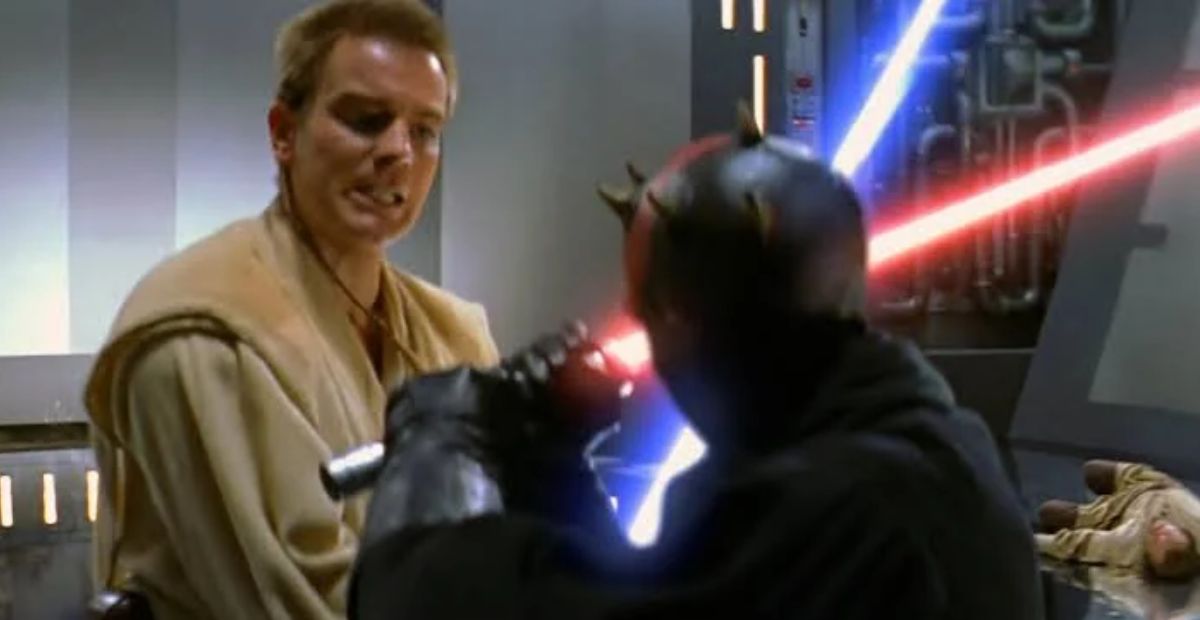When we look back at Obi-Wan Kenobi’s duel with Darth Maul in The Phantom Menace, it stands out as one of the most intense moments in Star Wars history. After witnessing his master, Qui-Gon Jinn, cut down by Maul, Obi-Wan was overwhelmed with emotion—grief, rage, and the desperate need for vengeance.
We saw him launch into battle with a level of aggression that felt dangerously close to the dark side. Every strike carried the weight of his loss, and for a moment, it seemed like he was fighting not just to win, but to make Maul suffer. Yet, despite all that rage, Obi-Wan never gave in to the dark side.
That makes us wonder—how did he manage to hold on? With all the anger and hatred boiling inside him, why didn’t Obi-Wan fall like so many others before him?
A Moment of Uncontrolled Rage
As soon as Obi-Wan saw Maul strike Qui-Gon with a fatal blow, his initial reaction was one of raw, unchecked fury. It was one of the rare moments in the Star Wars saga where Obi-Wan lost control of his emotions.
His strikes against Maul became noticeably more aggressive, reflecting the anger that surged within him in that split second.
This raw emotion is the closest we see Obi-Wan to embracing hatred, a key tool of the dark side.
However, this surge of anger didn’t last long enough to truly sway him. While the dark side thrives on powerful emotions like hatred and vengeance, Obi-Wan’s fury is brief, and he quickly regains control.
His Jedi training kicked in, allowing him to transition from pure emotion back to the calm focus that defined his mastery of the Force.
Obi-Wan’s commitment to the Jedi Code allowed him to maintain his clarity in the face of such intense emotional provocation.
This isn’t the only time we see Obi-Wan keeping his mind clear, even as those closest to him are on the verge of death.
One of the most poignant examples of this comes from The Clone Wars series when Darth Maul kills Satine Kryze, the Duchess of Mandalore, in front of Obi-Wan.
Maul, seeking to provoke and emotionally wound Obi-Wan, thought that killing Satine would push the Jedi to anger and hatred.
Instead, Obi-Wan doesn’t respond with rage or seek immediate revenge. He stands firm, sorrowful but composed, once again showcasing his deep commitment to Jedi principles, even in the face of overwhelming grief.
Maul’s attempt to draw him into the dark side through personal tragedy failed because Obi-Wan’s resolve and adherence to the Jedi Code were too strong.
Finding Clarity in the Aftermath
After Maul kicked Obi-Wan into the reactor pit, Obi-Wan found himself hanging on for dear life. It’s at this moment that we see Obi-Wan make a crucial decision—one that saved him from the dark side.
Instead of succumbing to fear, anger, or desperation, Obi-Wan calmed himself and called upon the Force to leap back into action. This is a key point because it highlights Obi-Wan’s ability to step back from the edge of his emotions and return to his Jedi training.
When Obi-Wan retrieved Qui-Gon’s lightsaber and ultimately cut Maul in half, it was done not out of hatred or a desire for revenge, but out of necessity.
He did what he had to in order to stop Maul from causing further harm. This ability to detach from negative emotions, even in the face of personal loss, is a hallmark of a true Jedi.
If Obi-Wan had allowed his emotions to take over, his actions could have been sloppy and unfocused, leaving him vulnerable.
He might have made rash decisions or fallen into the pit in a desperate attempt to confront Maul, but his training allowed him to remain centered.
In the end, Obi-Wan’s ability to detach from his anger and grief allowed him to emerge victorious, not out of a desire for revenge, but out of a need to stop Maul’s threat.
This moment encapsulates what makes Obi-Wan such a strong and disciplined Jedi—his ability to confront his emotions, but not be consumed by them, even in the most challenging of circumstances.
Obi-Wan’s Adherence to the Jedi Code
Throughout his life, Obi-Wan Kenobi stood as one of the Jedi Order’s most dedicated adherents to the Jedi Code.
Even in moments of personal tragedy—such as losing Qui-Gon Jinn, witnessing Anakin’s betrayal, and experiencing the fall of the Jedi Order—Obi-Wan never allowed his emotions to dictate his actions.
This unwavering commitment to the ideals of the Jedi is the key reason why Obi-Wan didn’t fall to the dark side during his duel with Maul.
His ability to rise above personal emotions and stay committed to the greater good defines his strength as a Jedi.
In their final encounter on Tatooine, as seen in Star Wars Rebels, Obi-Wan once again demonstrated his dedication to the Jedi way.
Despite all that Maul had done to him, from killing Satine Kryze to causing havoc during the Clone Wars, Obi-Wan didn’t harbor hatred or a thirst for revenge.
Instead, Obi-Wan remained calm, composed, and in control of his emotions. In his final moments, Maul, still consumed by revenge, was swiftly defeated by Obi-Wan, but even then, Obi-Wan showed Maul compassion.
He understood that Maul was not just an enemy, but also a victim of Darth Sidious’ manipulation.
Obi-Wan’s ability to empathize, even after all the harm Maul had caused, highlights the core difference between him and those who fall to the dark side: his capacity for mercy and understanding, even toward a long-time adversary.

